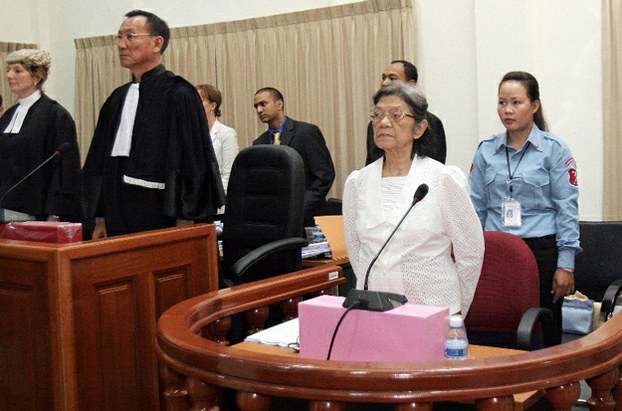Cambodia: Khmer Rouge tribunal vows to press on with trials after Ieng Thirith's death
| Publisher | Radio Free Asia |
| Publication Date | 24 August 2015 |
| Cite as | Radio Free Asia, Cambodia: Khmer Rouge tribunal vows to press on with trials after Ieng Thirith's death, 24 August 2015, available at: https://www.refworld.org/docid/55e59cd88.html [accessed 20 May 2023] |
| Disclaimer | This is not a UNHCR publication. UNHCR is not responsible for, nor does it necessarily endorse, its content. Any views expressed are solely those of the author or publisher and do not necessarily reflect those of UNHCR, the United Nations or its Member States. |
2015-08-24
 Former Khmer Rouge minister of social affairs Ieng Thirith (2nd R) appeals for release at the Extraordinary Chambers in the Court of Cambodia in Phnom Penh, May 21, 2008. AFP
Former Khmer Rouge minister of social affairs Ieng Thirith (2nd R) appeals for release at the Extraordinary Chambers in the Court of Cambodia in Phnom Penh, May 21, 2008. AFP
The death of Ieng Thirith will not affect the proceedings of the Cambodian tribunal trying other senior members of the former Khmer Rouge regime for alleged international law violations and crimes committed during the country's genocide, a spokesman from the national court said.
Ieng Thirith, a former minister of social affairs in the Khmer Rouge who was indicted on charges of genocide, crimes against humanity and grave breaches of the Geneva Conventions of 1949, was the murderous regime's most powerful woman. She died on Saturday in western Cambodia's Pailin province at the age of 83.
Neth Pheaktra, press officer of the Extraordinary Chambers in the Courts of Cambodia, also known as the Khmer Rouge Tribunal, told RFA's Khmer Service that he was waiting to hear from Ieng Thirith's family as well as her co-prosecutors for confirmation of the cause of death. She is believed to have died of a heart attack.
"The court will examine [her case] with the pre-trial chamber and decide in successive stages [what to do] after they obtain reports from the co-prosecutors who are monitoring the status of her death," he told RFA's Khmer Service. "So far, we have not received any notice."
The pre-trial chamber can hear motions and appeals against orders issued by co-investigating judges while a case is still under investigation.
The United Nations-backed Cambodian court was formed in 2006 to prosecute Khmer Rouge leaders responsible for the deaths of nearly 2 million Cambodians from starvation, exhaustion, forced labor and execution during the communist regime that ruled Cambodia from 1975-1979.
Ieng Thirith was arrested in 2007 along with her husband, Ieng Sary, a co-founder of the regime and former foreign minister, and charged with crimes against humanity, genocide, homicide, torture and religious persecution. She denied the charges against her.
She was indicted in 2010, but deemed unfit to stand trial two years later because of dementia.
The trial chamber stayed the proceedings against her, and she was released from provisional detention on bail, although she remained under the close supervision of the court. But the charges against her were not dropped.
Ieng Sary died of heart failure in March 2013 before the case against him could be brought to a verdict.
After his death, the pre-trial chamber obtained reports from the co-prosecutors and issued a ruling to terminate the court's proceedings and civil cases against him, Neth Pheaktra said.
Speed up the trials
Long Panhavuth, an observer of the Khmer Rouge court, said the successive deaths of former regime leaders is a sign that the court needs to speed up their trials so victims can receive justice.
Stymied by infighting, political interference, and funding shortages, the tribunal has handed down only three guilty verdicts during the nearly 10 years of its work.
Last August, the court found guilty two of Ieth Thirith's co-defendants – Nuon Chea, the Khmer Rouge's chief ideologist and second-in-command, and Khieu Samphan, a former head of state – and sentenced them to life in prison for crimes against humanity. Both are involved in a separate trial on genocide charges.
In July 2010, the court found Kang Kek Iew, who oversaw a special branch of the Khmer Rouge in charge of internal security and running prison camps, guilty of crimes against humanity and grave breaches of the Geneva Conventions. He received a life sentence in prison.
Reported by So Chivy and Maly Leng for RFA's Khmer Service. Translated by Yanny Hin. Written in English by Roseanne Gerin.
Link to original story on RFA website
